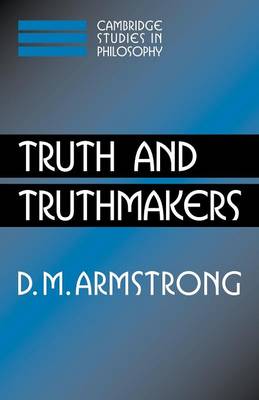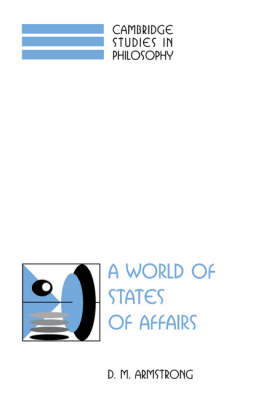Cambridge Studies in Philosophy
4 total works
Truths are determined not by what we believe, but by the way the world is. Or so realists about truth believe. Philosophers call such theories correspondence theories of truth. Truthmaking theory, which now has many adherents among contemporary philosophers, is a recent development of a realist theory of truth, and in this book, first published in 2004, D. M. Armstrong offers the first full-length study of this theory. He examines its applications to different sorts of truth, including contingent truths, modal truths, truths about the past and the future, and mathematical truths. In a clear, even-handed and non-technical discussion he makes a compelling case for truthmaking and its importance in philosophy. His book marks a significant contribution to the debate and will be of interest to a wide range of readers working in analytical philosophy.
This is a study of a crucial and controversial topic in metaphysics and the philosophy of science: the status of the laws of nature. D. M. Armstrong works out clearly and in comprehensive detail a largely original view that laws are relations between properties or universals. The theory is continuous with the views on universals and more generally with the scientific realism that Professor Armstrong has advanced in earlier publications. He begins here by mounting an attack on the orthodox and sceptical view deriving from Hume that laws assert no more than a regularity of coincidence between instances of properties. In doing so he presents what may become the definitive statement of the case against this position. Professor Armstrong then goes on to establish his own theory in a systematic manner defending it against the most likely objections, and extending both it and the related theory of universals to cover functional and statistical laws. This treatment of the subject is refreshingly concise and vivid: it will both stimulate vigorous professional debate and make an excellent student text.
In this important study D. M. Armstrong offers a comprehensive system of analytical metaphysics that synthesises but also develops his thinking over the last twenty years. Armstrong's analysis, which acknowledges the 'logical atomism' of Russell and Wittgenstein, makes facts (or states of affairs, as the author calls them) the fundamental constituents of the world, examining properties, relations, numbers, classes, possibility and necessity, dispositions, causes and laws. All these, it is argued, find their place and can be understood inside a scheme of states of affairs. This is a comprehensive and rigorously this-worldly account of the most general features of reality, argued from a distinctive philosophical perspective, and it will appeal to a wide readership in analytical philosophy.
David Armstrong's book is a contribution to the philosophical discussion about possible worlds. Taking Wittgenstein's Tractatus as his point of departure, Professor Armstrong argues that nonactual possibilities and possible worlds are recombinations of actually existing elements, and as such are useful fictions. There is an extended criticism of the alternative-possible-worlds approach championed by the American philosopher David Lewis. This major work will be read with interest by a wide range of philosophers.


